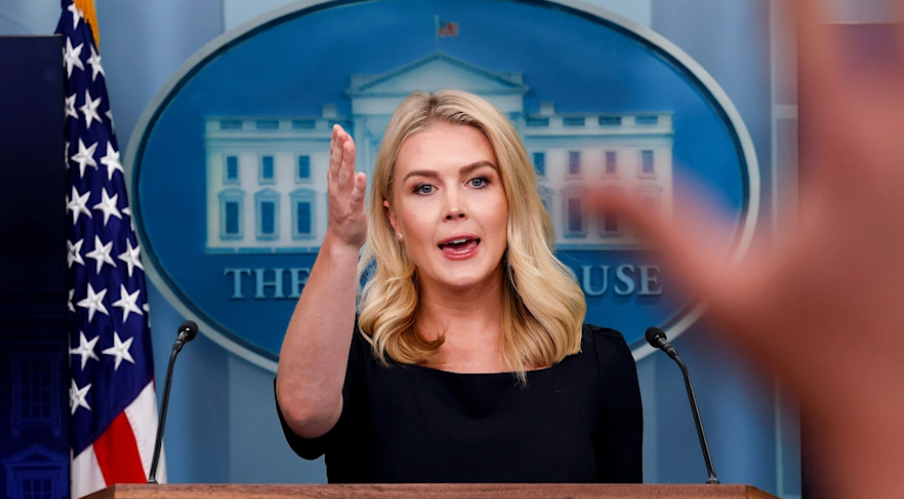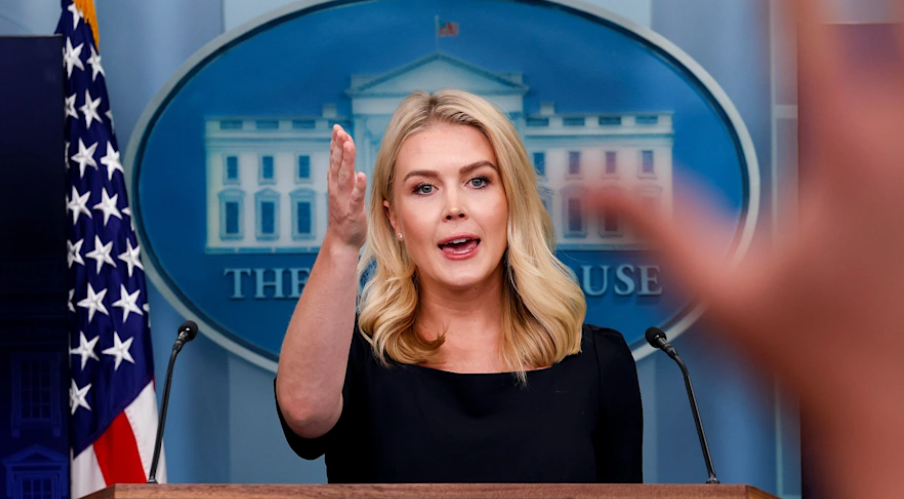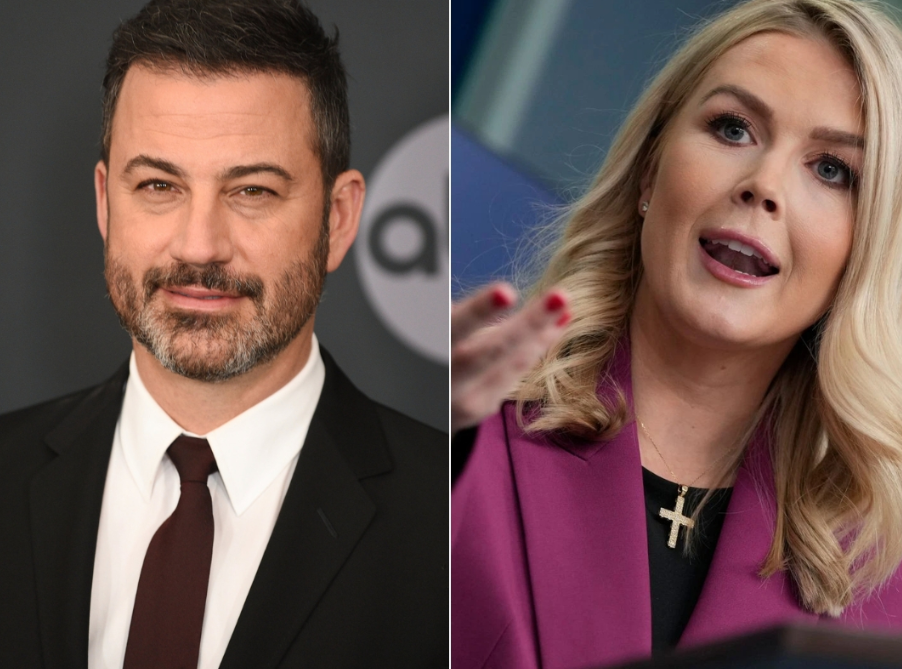
What started as a routine political interview quickly spiraled into one of the most jaw-dropping moments in late-night TV history.
The star of the night? Karoline Leavitt – the youngest White House press secretary ever – who walked onto Kimmel’s stage with the poise of someone ready to face the heat. Clad in a sharp blue suit, radiating calm confidence, and flashing a composed smile, she greeted the audience. The crowd’s reaction? A mix of wild cheers and fierce boos, setting the stage for a showdown that had everyone on the edge of their seats.
Leavitt came prepared. She was ready to defend the administration’s policies, tackle tough questions, and hold her ground. But she may have underestimated just how quickly things would get heated.
Kimmel, known for his razor-sharp wit, opened the conversation with a friendly introduction. Leavitt responded smoothly: “Thanks for having me, Jimmy—happy to be here.” The early part of the interview felt routine: gas prices, student loans, the economy. Leavitt handled each question like a pro, delivering polished, direct answers that reflected her experience behind the White House podium.
But the tension in the room was rising, and everyone felt it.
Then came the moment that sent shockwaves through the room. Kimmel leaned in, his trademark smirk flashing, and fired the question:
“Do you actually believe the stuff you say at those press briefings… or is it all just acting?”
The crowd exploded with laughter, but Leavitt didn’t flinch. Her smile tightened ever so slightly as she delivered her response:
“I speak for the president and the American people. I share facts, even if the media chooses to ignore them.”
The battle lines were drawn. And this was just the beginning.

The Jabs Begin: Where Facts Collide with Jokes at the White House Podium
The room fell eerily silent. The burst of laughter from moments earlier faded into an uneasy tension, thick enough to cut with a knife. A few hesitant claps echoed awkwardly, while others simply stared—unsure of how to react.
Kimmel leaned back, arching an eyebrow, and quipped, “Facts? That’s a bold word in Washington.” A nervous ripple of laughter fluttered through the audience, but it wasn’t the same lighthearted fun as before. Something had shifted. The air was heavier, the stakes suddenly real.
Leavitt didn’t miss a beat. Her smile tightened, and her voice cut through the room like a blade. “It’s easy to make jokes about politics when you don’t have to lead. Maybe that’s why you’re behind a desk—and I’m at the White House podium.”
The words hit like a punch to the gut. Gasps erupted across the studio. Some audience members stood and applauded, while others booed even louder. Phones flew up in the air, recording the fiery exchange, while backstage producers scrambled, whispering urgently into their headsets.
The atmosphere had flipped completely.
Kimmel’s usual sparkle dimmed. His smile faltered. He tried to recover, but the tension clung to the room. “Okay,” he said, voice tight, “but let’s be honest—your administration’s struggling. The economy’s shaky, the border’s a mess, your boss’s approval ratings are tanking.”
Leavitt’s response was immediate, her tone sharper than ever. “Criticism comes with the job, Jimmy. But what do you offer? Jokes, memes, sarcastic monologues? The American people deserve more than cheap shots from a Hollywood stage.”
Silence. Shock. The energy was electric. This wasn’t just an interview—it was a clash of worlds.
The Clip, the Clapback, and the CNN Frenzy
Kimmel wasn’t done yet. He escalated the moment by playing a clip on the giant screen behind them—a highlight from one of Leavitt’s past press briefings. The footage showed her pausing mid-sentence during a tough question about inflation, the camera zooming in on her face as an opportunistic reporter smirked in the front row.
The crowd erupted in laughter, but Leavitt didn’t flinch. Not a blink, not a twitch. She glanced at the screen, then back at Kimmel with a razor-sharp smile.
“That’s your big moment?” she said, voice cool as ice. “A five-second clip taken out of context? Maybe you should apply for a job at CNN.”
Boom. The room split down the middle—half the audience erupted into applause and cheers, while the other half sat in stunned silence. The temperature in the studio had hit boiling point.
Kimmel leaned forward, visibly irritated. His voice sharpened as he fired back: “You always talk about context—so what’s the context for misleading people? What’s the context for defending chaos?”
The tension was electric. You could feel it in the air.
But Leavitt didn’t back down—not an inch. She locked eyes with Kimmel, voice steady, and delivered the line that would have everyone talking:
“The context is this: your show survives by keeping people angry and divided. You don’t want answers—you want outrage. I came here to talk about policy. You came here to score points and stir drama.”
The audience wasn’t just watching a late-night interview anymore—they were witnessing a live political firestorm, unfiltered and unscripted.
A producer was overheard whispering, “Should we cut to commercial?” But the director’s response said it all:
“No. Let it roll. This is gold.”

The Walkout: A Bold Stand or a Calculated Stunt?
Leavitt turned to the crowd, her voice steady but firm. “You don’t have to agree with me,” she said, “but don’t let late-night comedians decide what’s true. They’re here to entertain you, not inform you.”
The audience exploded—applause clashing with shouts. Kimmel, visibly irked, cut her off with a sharp hand gesture. “Let me stop you right there,” he snapped. “If anyone’s deciding what’s true, it’s the press secretary dodging every real question.”
Gasps rippled through the studio. Without missing a beat, Leavitt shot back: “Maybe if reporters asked real questions, I wouldn’t have to dodge anything.”
The energy shifted. It wasn’t playful anymore—it was a full-on verbal brawl, and the crowd could hardly believe what they were witnessing.
A heavy silence settled over the room. Leavitt leaned in, her tone low but cutting through the tension like a scalpel. “Let’s actually talk about facts, Jimmy,” she said. “You love to rant about misinformation, but how many times have you twisted something on this show just to get a laugh?”
The audience audibly reacted—gasps, murmurs, even a few uneasy laughs. Camera operators shifted nervously. Kimmel blinked, caught off guard. “I’m a comedian,” he said, voice strained. “People come here for jokes, not lectures.”
Leavitt, unflinching, stepped right into the moment. “And I’m the press secretary. I don’t get a laugh track when I share policy. I stand in front of a room full of journalists and answer hard questions every day. You have the luxury of hiding behind a script.”
The room was stunned. Even Kimmel’s loyal crowd seemed unsure how to react—this wasn’t the usual banter. Leavitt wasn’t just holding her own; she was owning the moment.
Then, the final blow.
Kimmel’s smile faded completely. He leaned forward, voice low and tense. “Do you really believe you’re helping people? Because from where I’m sitting, it looks like all you do is spin for a president who can barely put a sentence together.”
The air left the room. The silence was suffocating.
Leavitt’s jaw tightened, but her voice stayed calm, unwavering. “Say what you want about the president,” she said, “but at least he’s not sitting behind a desk throwing cheap insults to get applause. Leadership is hard. Mocking it from a distance? That’s easy.”
The energy snapped—audible gasps, stunned faces, scattered claps. Even Kimmel seemed unsure what to do next.
This wasn’t a segment anymore—it was a standoff, live on national television.
Kimmel tried to pivot. “I invited you for a conversation,” he said, voice tight, “but clearly, you came here for a fight.”
Leavitt straightened in her chair, her voice razor-sharp. “No, I came here to defend the truth. But if that makes you uncomfortable, maybe you should stick to celebrity gossip and leave politics to the professionals.”
Boom. The studio erupted. Cheers. Boos. Phones up, recording every second. Twitter, TikTok, and YouTube lit up instantly. The clip spread like wildfire.
Backstage, a producer frantically shouted, “Cut to commercial! Cut!” But the director fired back: “No. Let it roll. This is history.”
Leavitt stood up, pulled off her mic, and faced the stunned crowd. “I came here in good faith,” she said, voice raised just enough to echo through the room, “but it’s clear Jimmy isn’t interested in a real conversation. He wants soundbites and viral clips. I won’t be a prop in someone else’s game.”
And just like that, she walked out—mic dropped, moment sealed.
Was it a bold stand for truth, or a calculated PR move? Had Kimmel crossed a line for ratings, or was he holding power accountable? The debate exploded beyond the studio, sparking conversations across America that are still raging.


